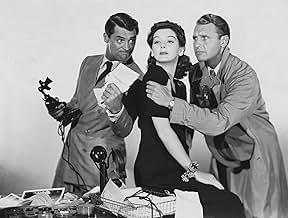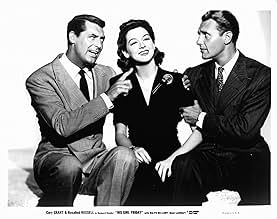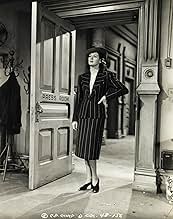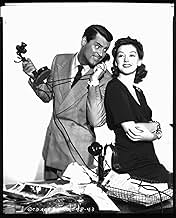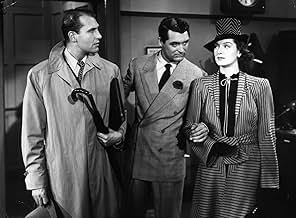IMDb-BEWERTUNG
7,8/10
66.218
IHRE BEWERTUNG
Ein Zeitungsredakteur versucht mit allen möglichen Tricks, die Ex-Frau seines Starreporters davon abzuhalten, diesen noch einmal zu heiraten.Ein Zeitungsredakteur versucht mit allen möglichen Tricks, die Ex-Frau seines Starreporters davon abzuhalten, diesen noch einmal zu heiraten.Ein Zeitungsredakteur versucht mit allen möglichen Tricks, die Ex-Frau seines Starreporters davon abzuhalten, diesen noch einmal zu heiraten.
- Auszeichnungen
- 5 Gewinne & 1 Nominierung insgesamt
Empfohlene Bewertungen
When I learned about Howard Hawkes screwball comedy "His Girl Friday," one of the biggest attractions, I was told, was the fast-paced/overlapping dialogue. During this time in Hollywood, dialogue would only be spoken by one person at a time. "His Girl Friday" was one of the first films to have characters speaking at the same time, often over one another; this would create an environment that was more realistic, especially in a place such as a newspaper room. Well, if that's what Hawkes was going for, he certainly achieved it.
The best thing about the film IS the dialogue. Characters speak at a break-neck speed, throwing witticisms left and right as if they were candy. Many times, while one is laughing at one joke, they would miss another right after it. That is how quickly the jokes are thrown out in the film. Cary Grant and Rosalind Russell are great at spilling lines out seemingly without any problem. It's a real testament to how professional these two were (along with the rest of the cast) with the amount of verbal meat they had to chew; I can't think of an actor today that could possibly pull of the kind of dialogue that was given in this film.
The problem that I had with the film was that the dialogue was the ONLY great thing about it. Unfortunately, the characters and situations presented in the film had little sympathy and lack of any kind of real depth. The situation with the falsely accused murderer was handled poorly given the context of his predicament; instead of really caring about this person and really trying to help him become cleared of charges, the Grant and Rosalind characters instead used him for their own purposes in getting "the big scoop." Now, of course one can argue that that WAS the reason they treated him the way they did, my issue is that such a serious subject was handled in a supposed "comedic" fashion; as if it was OK that this falsely accused person can be treated in such a horrible way, simply because it handled comedically. The last-second deus ex machina that sealed this person's fate supports the idea that his story wasn't really handled with any kind of importance.
The thing the really hurt the film was the love triangle between the Grant and Rosalind characters, and the Rosalind's character's fiancé. We are told in the beginning of the film that Grant and Rosalind are divorcees, and Rosalind is set to marry her fiancé the very next day in Albany. Of course, in a film like this, we are supposed to root for the Grant and Rosalind characters to get together at the end. the problem is, the Grant character is such a manipulative creep that at the end of the film I found myself actually rooting for the fiancé to the win the girl. Three times in the movie, the Grant character manipulates the situation, causing the fiancé to be thrown in jail, and preventing the would-be married couple from leaving the city. This in turn gives the Grant character enough time to convince Rosalind that she will always be "a newspaperman." The Rosalind character isn't much better either. Throughout the beginning of the film, she keeps explaining to others that she is through with the newspaper business, that she wants to settle down, raise a family, and not have to deal with the daily grind of hunting down a story. Well, does settling down and having a family sound like a bad thing to you? I didn't think so. Every time she tries to leave, she gets bogged down and distracted by the story (many times through the very fault of the Grant character). It gets so bad, that when the fiancé comes to her, begging her to leave with him, she brushes him off like a fly, barely acknowledging him. Even worse, when the fiancé's mother comes into play, the Rosalind character actually ALLOWS Grant to have her kidnapped and taken away! "His Girl Friday" would've worked if the filmmakers had cared enough about the characters than they did about the dialogue. The actor playing the fiancé did a thankless job; without much to work with, he actually created a character we cared about more so than the two leads. Sure he was a little simple, but that's a lot more than can be said about the other two. At the end of the film, I thought to myself "these two characters were divorced before the film started. Based on all the manipulative actions these two had throughout the story, is there any evidence that they'll stay together once the movie is over?" Maybe they deserve each other, because they certainly don't deserve anyone else.
The best thing about the film IS the dialogue. Characters speak at a break-neck speed, throwing witticisms left and right as if they were candy. Many times, while one is laughing at one joke, they would miss another right after it. That is how quickly the jokes are thrown out in the film. Cary Grant and Rosalind Russell are great at spilling lines out seemingly without any problem. It's a real testament to how professional these two were (along with the rest of the cast) with the amount of verbal meat they had to chew; I can't think of an actor today that could possibly pull of the kind of dialogue that was given in this film.
The problem that I had with the film was that the dialogue was the ONLY great thing about it. Unfortunately, the characters and situations presented in the film had little sympathy and lack of any kind of real depth. The situation with the falsely accused murderer was handled poorly given the context of his predicament; instead of really caring about this person and really trying to help him become cleared of charges, the Grant and Rosalind characters instead used him for their own purposes in getting "the big scoop." Now, of course one can argue that that WAS the reason they treated him the way they did, my issue is that such a serious subject was handled in a supposed "comedic" fashion; as if it was OK that this falsely accused person can be treated in such a horrible way, simply because it handled comedically. The last-second deus ex machina that sealed this person's fate supports the idea that his story wasn't really handled with any kind of importance.
The thing the really hurt the film was the love triangle between the Grant and Rosalind characters, and the Rosalind's character's fiancé. We are told in the beginning of the film that Grant and Rosalind are divorcees, and Rosalind is set to marry her fiancé the very next day in Albany. Of course, in a film like this, we are supposed to root for the Grant and Rosalind characters to get together at the end. the problem is, the Grant character is such a manipulative creep that at the end of the film I found myself actually rooting for the fiancé to the win the girl. Three times in the movie, the Grant character manipulates the situation, causing the fiancé to be thrown in jail, and preventing the would-be married couple from leaving the city. This in turn gives the Grant character enough time to convince Rosalind that she will always be "a newspaperman." The Rosalind character isn't much better either. Throughout the beginning of the film, she keeps explaining to others that she is through with the newspaper business, that she wants to settle down, raise a family, and not have to deal with the daily grind of hunting down a story. Well, does settling down and having a family sound like a bad thing to you? I didn't think so. Every time she tries to leave, she gets bogged down and distracted by the story (many times through the very fault of the Grant character). It gets so bad, that when the fiancé comes to her, begging her to leave with him, she brushes him off like a fly, barely acknowledging him. Even worse, when the fiancé's mother comes into play, the Rosalind character actually ALLOWS Grant to have her kidnapped and taken away! "His Girl Friday" would've worked if the filmmakers had cared enough about the characters than they did about the dialogue. The actor playing the fiancé did a thankless job; without much to work with, he actually created a character we cared about more so than the two leads. Sure he was a little simple, but that's a lot more than can be said about the other two. At the end of the film, I thought to myself "these two characters were divorced before the film started. Based on all the manipulative actions these two had throughout the story, is there any evidence that they'll stay together once the movie is over?" Maybe they deserve each other, because they certainly don't deserve anyone else.
10banjoboy
I just finished watching the DVD of this first-class, semi-Screwball comedy in Columbia Classics beautiful transfer, and it absolutely made my day! What a movie! What a screenplay! The dialogue is better - more modern - in fact, than a in lot of contemporary movies. It's incredibly funny, too, and my teenage sons kept laughing right along with me at the smart come-backs. Cary Grant is, of course, as good (if not better) than ever, and I've never seen Rosalind Russel in a role that suited her more perfectly. And that's just for starters: The timing of the thing is still awe- inspiring after sixty-odd years; the supporting actors, down to the bit-players, are all memorable, convincing and hilarious; the camera work (this IS the forties, though) is inventive and the editing superb. I can safely confess now that I hadn't ever seen it before, but that's no reason for you to make the same mistake: Go buy/rent it NOW! Hats off to the great Howard Hawks, his cast and crew for pulling this comedy masterpiece off. And thank you, thank you, thank you Columbia Pictures, for
making it possible for me to watch it in such pristine condition! (I've got the 2002 edition, and from what I've heard you should beware of earlier DVD issues).
making it possible for me to watch it in such pristine condition! (I've got the 2002 edition, and from what I've heard you should beware of earlier DVD issues).
If Howard Hawks's screwball classic "His Girl Friday" isn't a perfect film, it had at least a perfect role for Cary Grant and Rosalind Russell... and that's the stuff durable greatness is made of.
Indeed, Grant was the epitome of wisecracking charm and his Walter Burns happened to be an obnoxious fellow delivering so many wisecracks that by the time the receiver found the proper repartee, someone was already being verbally crucified.
Rosalind Russell wasn't a star... yet... until she portrayed Burns' ace reporter and ex-wife Hildy Johnson, reliable and relatable 'girl Friday'. These two backgrounds explain why she plays in the same rhetorical league, she's a match to him... even when there's no matching anymore.
But maybe because she's taller than many actresses, she can get above Grant's shoulder high enough not to be totally swollen off by his charismatic despicability. She talks the talks but can walk the walk even if he's gallant enough to hold her the door... but why would a woman calling herself a newspaperman expect gallantry?
At a time where gender talk wasn't such a sensitive subject and this is where the film got tricky, Hildy is engaged to insurance agent Bruce Baldwyn and is determined to become his devoted housewife, to have children and live a peaceful life in Albany, of all the towns... so she expects some gentlemanly behavior from her editor and former husband... might as well expect Hitler to sign a Peace Treaty.
The titular 'Girl Friday' can't wait for her existential 'week-end', torn between her job and her future. The way the film makes these two situations irreconcilable can seem far-fetched but given the way Hildy handles her job, it's hard to imagine the combo. The lady must make up her mind. Meanwhile, Burns gets an opportunity that instantly tilts in his mind "thanks God, it's Friday!".
As usual with screwball comedies, the timing is crucial and when a top reporter is missing and an execution is polarizing opinions because of proclaimed insanity and suspicion of political motivations, someone must cover the news and Hildy happened to be in the right place at the right moment.
For Walter, Hildy's presence is to be exploited even if it means using every bit of his malevolent creativity against the gentle but rather bland Bruce... who looks exactly like Ralph Bellamy, according to Burns (or was it Grant having fun with the script?). Given the mistreatment poor Bruce undergoes, "His Girl Friday" is a tale of Machiavellian ingenuity at the services of one profession: journalism. Basically, the ends justify the means if it means covering the hottest topic of the day (pre-war days but they didn't know).
So Burns uses every trick of his sleeve to prevent Bruce from taking the train and forces Hildy to be on the front... and for the front, fully aware that her professional conscience will finally get the best of her. And there is something in Russell's performance, the way she resists the call of her profession while being fiercely attached to her fiancée that calls for admiration.
Whether she handles the other journalists who pose like vulture-like creatures, indifferent to the pleas of Williams' friend and hungry for any scandal or tip to it, she knows how to adapt her manners, to talk different languages, but that would be too easy with screwball comedy. We noticed from the start that the pace of the dialogue is as quick as if the box office depended on it, yet Hawks gratifies us with scenes where journalists and Burns are all together, sometimes, Bruce and Walter talk to Hildy and on the phone and the rhythm is so fast it sounds like harmonious cacophony.
The film was known for having a dialogue that could be contained in a twice longer film but Hawks insisted on having something natural that could flow simply and easily because people did talk like this in real life. And only for the rapid fire delivery of Russell, I'm glad they didn't take someone else, I can't imagine Katharine Hepburn in that role, Russell had the street smarts, the modern touch, the look, the sexiness... she got the scandal but the only thing she didn't get was an Oscar nomination, and that was a scandal too.
I didn't like the film at first because I have a problem with the schematic aspect of screwball comedies, the two men in love with the same woman and one of them has no chance because the other is Grant, that's why I didn't like "The Philadelphia Story"... but here, Grant is so unlikable you've got to wonder how come he had to get Russell at the end except to show that these two were equally unlikable thus meant to be together, which in that case makes the film modern in its daring anti-family bias.
And the ending doesn't imply that Hildy made the right personal choices, maybe journalists have a way with every non-personal matters but are totally ignorant of the things of life. I recently saw "Sweet Smell of Success" and I guess it's a common trope of Hollywood to depict journalism as a business dealing with cops, politicians, uses of bribes or blackmails and many methods that can only give it a cynical flavor.
Grant could embody these traits without being totally detestable, maybe it's because we try to see them from the eyes of Hildy and we accept that he's not such a bad guy after all. Ironically, when Hildy becomes the newspaper man, she lets the woman takes the upper hand and encourage Burns to show a more comprehensive and gentle side. But Hawks was a smart director, if he was smart enough to know that he could remake "The Front Page" with a gender swap, he could handle his characters as well.
After all, they might be unlikable but they have a likable way to be unlikable, and that's also the stuff durable greatness is made on.
Indeed, Grant was the epitome of wisecracking charm and his Walter Burns happened to be an obnoxious fellow delivering so many wisecracks that by the time the receiver found the proper repartee, someone was already being verbally crucified.
Rosalind Russell wasn't a star... yet... until she portrayed Burns' ace reporter and ex-wife Hildy Johnson, reliable and relatable 'girl Friday'. These two backgrounds explain why she plays in the same rhetorical league, she's a match to him... even when there's no matching anymore.
But maybe because she's taller than many actresses, she can get above Grant's shoulder high enough not to be totally swollen off by his charismatic despicability. She talks the talks but can walk the walk even if he's gallant enough to hold her the door... but why would a woman calling herself a newspaperman expect gallantry?
At a time where gender talk wasn't such a sensitive subject and this is where the film got tricky, Hildy is engaged to insurance agent Bruce Baldwyn and is determined to become his devoted housewife, to have children and live a peaceful life in Albany, of all the towns... so she expects some gentlemanly behavior from her editor and former husband... might as well expect Hitler to sign a Peace Treaty.
The titular 'Girl Friday' can't wait for her existential 'week-end', torn between her job and her future. The way the film makes these two situations irreconcilable can seem far-fetched but given the way Hildy handles her job, it's hard to imagine the combo. The lady must make up her mind. Meanwhile, Burns gets an opportunity that instantly tilts in his mind "thanks God, it's Friday!".
As usual with screwball comedies, the timing is crucial and when a top reporter is missing and an execution is polarizing opinions because of proclaimed insanity and suspicion of political motivations, someone must cover the news and Hildy happened to be in the right place at the right moment.
For Walter, Hildy's presence is to be exploited even if it means using every bit of his malevolent creativity against the gentle but rather bland Bruce... who looks exactly like Ralph Bellamy, according to Burns (or was it Grant having fun with the script?). Given the mistreatment poor Bruce undergoes, "His Girl Friday" is a tale of Machiavellian ingenuity at the services of one profession: journalism. Basically, the ends justify the means if it means covering the hottest topic of the day (pre-war days but they didn't know).
So Burns uses every trick of his sleeve to prevent Bruce from taking the train and forces Hildy to be on the front... and for the front, fully aware that her professional conscience will finally get the best of her. And there is something in Russell's performance, the way she resists the call of her profession while being fiercely attached to her fiancée that calls for admiration.
Whether she handles the other journalists who pose like vulture-like creatures, indifferent to the pleas of Williams' friend and hungry for any scandal or tip to it, she knows how to adapt her manners, to talk different languages, but that would be too easy with screwball comedy. We noticed from the start that the pace of the dialogue is as quick as if the box office depended on it, yet Hawks gratifies us with scenes where journalists and Burns are all together, sometimes, Bruce and Walter talk to Hildy and on the phone and the rhythm is so fast it sounds like harmonious cacophony.
The film was known for having a dialogue that could be contained in a twice longer film but Hawks insisted on having something natural that could flow simply and easily because people did talk like this in real life. And only for the rapid fire delivery of Russell, I'm glad they didn't take someone else, I can't imagine Katharine Hepburn in that role, Russell had the street smarts, the modern touch, the look, the sexiness... she got the scandal but the only thing she didn't get was an Oscar nomination, and that was a scandal too.
I didn't like the film at first because I have a problem with the schematic aspect of screwball comedies, the two men in love with the same woman and one of them has no chance because the other is Grant, that's why I didn't like "The Philadelphia Story"... but here, Grant is so unlikable you've got to wonder how come he had to get Russell at the end except to show that these two were equally unlikable thus meant to be together, which in that case makes the film modern in its daring anti-family bias.
And the ending doesn't imply that Hildy made the right personal choices, maybe journalists have a way with every non-personal matters but are totally ignorant of the things of life. I recently saw "Sweet Smell of Success" and I guess it's a common trope of Hollywood to depict journalism as a business dealing with cops, politicians, uses of bribes or blackmails and many methods that can only give it a cynical flavor.
Grant could embody these traits without being totally detestable, maybe it's because we try to see them from the eyes of Hildy and we accept that he's not such a bad guy after all. Ironically, when Hildy becomes the newspaper man, she lets the woman takes the upper hand and encourage Burns to show a more comprehensive and gentle side. But Hawks was a smart director, if he was smart enough to know that he could remake "The Front Page" with a gender swap, he could handle his characters as well.
After all, they might be unlikable but they have a likable way to be unlikable, and that's also the stuff durable greatness is made on.
This gloriously funny romp by Howard Hawks is rightly remembered as one of the fastest-talking movies ever made. Originally done as 'The Front Page', the play by Hecht and McArthur takes on new life here as the character of Hildy Johnson metamorphoses in this version to be a sparky woman (played by Rosalind Russell), former wife of the harassed columnist Walter Burns (played with characteristic bewilderment and charm by Cary Grant). Hildy is about to marry again, to the nice but dull Bruce Baldwin (played by Ralph Bellamy as a character so boring he 'is like Ralph Bellamy' - how Hollywood liked its in-jokes).
With that fire-cracking script, a sizable amount of sparks between Grant and Russell, and good support from Bellamy and a cast which includes Gene Lockhart, Cliff Edwards, Clarence Kolb, and Regis Toomey, 'His Girl Friday' is one of those classic gems which never age and which remain hugely entertaining.
With that fire-cracking script, a sizable amount of sparks between Grant and Russell, and good support from Bellamy and a cast which includes Gene Lockhart, Cliff Edwards, Clarence Kolb, and Regis Toomey, 'His Girl Friday' is one of those classic gems which never age and which remain hugely entertaining.
10TuckMN
This screen adaptation of the Ben Hecht and Charles MacArthur play "The Front Page" was adapted for the talents of Cary Grant and Rosalind Russell -- there is no such character as Hildy Johnson (Russell) in that play.
Director Howard Hawks wanted to show the whirlwind pace of the newsroom in the criminal courts system so he had his actors overlap their lines -- so much so that at times it seems as though everyone is talking at once; it even gets difficult to understand all that is going on.
He also had the cast move FAST so the film looks totally frenetic from scene to scene with no respite -- either from the laughs or from the action.
There are two really good "inside" jokes in the script: The first is where Walter Burns (Grant) is describing Hildy's fiancee and says that "he looks like that guy in the movies -- Bellamy," Well, it WAS Ralph Bellamy playing that part!
The other is when Burns says something about someone he once knew named "Archie Leach" which just happens to be Cary Grant's real name.
This is one of the true gems of Hollywood's most prolific era. It has incredible pacing, acting, photography and an authentic gritty feeling that would be associated with hard-boiled, "anything for a story" newspaper people.
It has long been one of my favorite films and deserves to be watched over and over again -- just for all the dialogue and great acting that may have gone by so fast you missed it the first time.
Director Howard Hawks wanted to show the whirlwind pace of the newsroom in the criminal courts system so he had his actors overlap their lines -- so much so that at times it seems as though everyone is talking at once; it even gets difficult to understand all that is going on.
He also had the cast move FAST so the film looks totally frenetic from scene to scene with no respite -- either from the laughs or from the action.
There are two really good "inside" jokes in the script: The first is where Walter Burns (Grant) is describing Hildy's fiancee and says that "he looks like that guy in the movies -- Bellamy," Well, it WAS Ralph Bellamy playing that part!
The other is when Burns says something about someone he once knew named "Archie Leach" which just happens to be Cary Grant's real name.
This is one of the true gems of Hollywood's most prolific era. It has incredible pacing, acting, photography and an authentic gritty feeling that would be associated with hard-boiled, "anything for a story" newspaper people.
It has long been one of my favorite films and deserves to be watched over and over again -- just for all the dialogue and great acting that may have gone by so fast you missed it the first time.
Wusstest du schon
- WissenswertesIt is estimated that the normal rate of verbal dialogue in most films is around 90 words a minute. In Sein Mädchen für besondere Fälle (1940), the delivery has been clocked at 240 words a minute.
- PatzerWhen Bruce Baldwin comes to the press room late in the movie, an electric fan and small shelf on the wall to the left of the door both completely disappear. Both have been there in all previous scenes and both reappear after this scene.
- Zitate
[describing Bruce]
Walter Burns: He looks like that fellow in the movies - Ralph Bellamy.
- Crazy CreditsOpening credits prologue: It all happened in the "Dark Ages" of the newspaper game--when to a reporter "Getting that story" justified anything short of murder.
Incidentally you will see in this picture no resemblance to the man and woman of the press today.
Ready?
Well, once upon a time - -
- VerbindungenEdited into Michael Jackson's This Is It (2009)
Top-Auswahl
Melde dich zum Bewerten an und greife auf die Watchlist für personalisierte Empfehlungen zu.
Details
- Erscheinungsdatum
- Herkunftsland
- Sprachen
- Auch bekannt als
- Ayuno de amor
- Drehorte
- Produktionsfirma
- Weitere beteiligte Unternehmen bei IMDbPro anzeigen
Box Office
- Weltweiter Bruttoertrag
- 330 $
- Laufzeit
- 1 Std. 32 Min.(92 min)
- Farbe
- Seitenverhältnis
- 1.37 : 1
Zu dieser Seite beitragen
Bearbeitung vorschlagen oder fehlenden Inhalt hinzufügen



